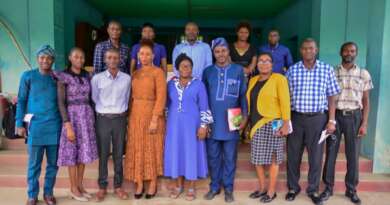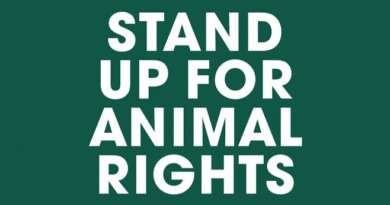Suggested Agenda For the Federal Ministry of Livestock Development on Improved Productivity
 By Dr Ibikunle Faramade
By Dr Ibikunle Faramade
The eventual creation of the Federal Ministry of Livestock Development (after the excision of the Animal Husbandry and Health component from the erstwhile Federal Ministry of Agriculture and Food Security is indeed a dream come true and a right policy decision of the Federal Government under the leadership of the President, Bola Ahmed Tinubu, GCFR.
It is on record that the animal husbandry and health components under the Ministry of Agriculture and Food Security was not as developed and focused like the crop component, in terms of intervention programs, diverse form of assistance for crop production (such as inputs including seed, fertilizer, irrigation, agricultural mechanization and other infrastructure, monetary incentives such as grants and cash transfer aimed at boosting crop production. These solid support framework for crop production is understandable, particularly, because of the significance of arable crop production in the achievement of food security. Arable crops constitute the bulk of supply of carbohydrate and vegetable proteins. The alleged battle against the food security system in Africa, especially Nigeria, is targeted at arable crop production, therefore, seeming policy preferences or bias in favour of crop production is well understood.
However, the place of animal production and health in the achievement of balance diet cannot be over emphasized. Apart from the nutritive value of animal protein and its direct bearing on the health of human population, the financial benefits accruable from many economic activities and many value chains involved from ‘farm to table’ is enormous. It has been a potential that has remained untapped since independence. Therefore, the bold step of creating a dedicated ministry to supervise livestock development to harness this enormous potential is highly commendable.
For this new Ministry to fulfil its mission, it is important to note that measurable short, medium and long term agenda must be set so as to use it as benchmarks of progress in the years ahead. Some of these suggested agenda are hereby enumerated for possible consideration in the overall interest of Nigerian economy:
- Livestock and Poultry Enumeration
Population estimation is a vital tool in economic development which helps to understand the peculiarity of each sector and enhances equity in allocation of resources. We need to know the population of our livestock and poultry to enhance planning and development of appropriate policy framework that could improve their productivity. This would also help to determine the density of livestock per state and geopolitical zone in order to know areas in which intervention would lead to maximum impact.
- Improvement of animal disease surveillance and disease reporting
The cost of feeding alone in livestock and poultry enterprise constitute at least 70% of the capital investment required by investors. Despite this fact, the impact of diseases on livestock profitability cannot be over emphasized. For the renewed hope agenda to achieve its desired intention in Nigeria, it is very important to put the improvement of animal disease surveillance and mechanisms for improved disease reporting in the front burner. The current state of disease reporting needs a lot of rejuvenation. The entire mechanism needs systemic overall. This should be done in tandem with the Department of Veterinary Services at the sub national (State) level. There is need for well-structured real time disease reporting mechanism which ensures accurate profiling of disease incidences throughout the country. This should not be limited to trans-boundary animal diseases alone. The ministry should develop a disease reporting template that would be difficult to manipulate whose accuracy and reliability could be vouched for. This would go a long way to safeguard investment in livestock enterprise and minimize production losses. The quantum of multiplier effects of this effort cannot be over-emphasized.
- Reinvigoration of Veterinary Diagnostic Laboratories
Effective animal health services rely on adequate veterinary laboratories which serve as the fulcrum for accurate disease diagnosis. The preeminent veterinary laboratory in Nigeria is the National Veterinary Research Institute, Vom, Plateau State, established in 1924. The Institute, over the years, has contributed significantly to the development of livestock sector in Nigeria serving as a reference laboratory for economically important diseases of livestock and poultry, including the production of animal vaccines in the last 100 years. The Institute deserves better funding and repositioning to perform better in this dispensation. In terms of manpower and laboratory infrastructure, NVRI deserves the attention of the Federal Ministry of Livestock Development. Apart from this, the zonal veterinary laboratories of the NVRI in the six geopolitical zones should be upgraded so that animal disease diagnosis could be closer to the farmers and companion animal owners. As we speak, there is a big gap between the veterinary practitioners and veterinary laboratories. Sending of samples, waiting for results etc. is currently cumbersome, leading to unavoidable losses for the farmers. No disease can be reported, even, notifiable diseases without confirmatory diagnosis. This is a gap that the Federal Ministry of Livestock Development should be ready to fill as a matter of urgency.
- Certification of Animal Products and By-products to Meet Export Standards
In order to derive maximum economic benefits from the livestock sector in Nigeria, there is a need to implement existing standards prescribed for the certification of animal products and by-products in Nigeria. For example, the state of abattoir services in most States of the Federation is very appalling. This is a disincentive to export. The Ministry should therefore challenge the state government to be intentional about overhauling the meat supply system. Private sector participation should be encouraged while the government supervise the processing including meat inspection to safeguard public health in order to boost international acceptability. While it is true that the current meat supply is in-adequate for domestic production, we should not lose sight on the long term goal of exportation to diversify the economy and improve our capital inflow from non-oil sector. The recent interest of the Brazilian meat conglomerate, JBS S.A. in Nigeria livestock and meat supply is a pointer to better days ahead.
- Capital incentives, promotion of livestock cooperative societies and adoption of Insurance policy uptake by livestock farmers.
 Apart from land, another major factor of production is capital. Without gainsaying, livestock investment is highly capital intensive. Livestock farmers requires capital boosts such as grants, loans packages with friendly interest rates that could stimulate participation in livestock production activities especially by the youth. The current double digit interest rate on commercial loan cannot support livestock production. In partnership with the Ministry of Trade and Investments, livestock farmer’s cooperative societies should be strengthened to assist farmers to grow their capital. The current level of uptake of Insurance products in the agricultural sub-sector, especially, among livestock farmers is reportedly low. This calls for sensitization and reorientation of farmers to create buffer for their businesses in case of unexpected losses.
Apart from land, another major factor of production is capital. Without gainsaying, livestock investment is highly capital intensive. Livestock farmers requires capital boosts such as grants, loans packages with friendly interest rates that could stimulate participation in livestock production activities especially by the youth. The current double digit interest rate on commercial loan cannot support livestock production. In partnership with the Ministry of Trade and Investments, livestock farmer’s cooperative societies should be strengthened to assist farmers to grow their capital. The current level of uptake of Insurance products in the agricultural sub-sector, especially, among livestock farmers is reportedly low. This calls for sensitization and reorientation of farmers to create buffer for their businesses in case of unexpected losses.
- Declarae State of Emergency on Animal Feed Supply
As stated earlier, the cost of feed constitute a major component of expenses in livestock and poultry farms. The perennial competition for grains, especially, maize and legumes such as soya beans between man and animals has got to a very critical level. This is exacerbated by the challenges of climate change and pervasive insecurity in major agrarian areas and most part of the northern Nigeria with favourable agro-climatic conditions. Research into economically viable alternatives to maize is essential to bring down the price of animal feed. Deliberate policy to reduce tariffs on essential feed ingredients that are not available locally should be made. The Ministry has to use multi-prong approach to address the challenge of high cost of feed if farmers must be in business.
- Manpower
Human resources takes the lead in the progress and development of any organization. Manpower required to drive innovative changes through paradigm shift should be prioritized if the renewed hope agenda of the President in the livestock sector would be realized. Right mix of veterinarians, animal scientists, animal health technologists, agribusiness and livestock extension experts etc. are required to translate policies and programs into reality. However, these technical components in the Ministry are required to build effective synergy with private sector operators. The success of livestock development in Nigeria relies on private participation, which the Ministry should encourage through the enactment of actionable policies. The success recorded in poultry sub-sector is a good example of how far private investors can go in revolutionizing livestock business in Nigeria.
In conclusion, the success of the Federal Ministry of Livestock Development depends on the priorities accorded the master plan already developed by the presidential committee on livestock development. The above highlighted suggested agenda could also add value to the Ministry as the newly appointed Honourable Minister takes his seat. All hands must be on deck to guarantee the success of this ministry. It should not be business as usual.
Dr. Ibikunle Faramade is a veterinary pathologist, sustainable development practitioner, animal welfare advocate and a lecturer at the Federal College of Animal Health & Production Technology, Apata. Ibadan. He’s the C.E.O of the Society for Animal Rights Protection, a non-profit and a non-governmental organization dedicated to the promotion of animal welfare, animal rights and prevention of cruelty to animals. animalrightsprotection2020@gmail.com , +2348028305284




